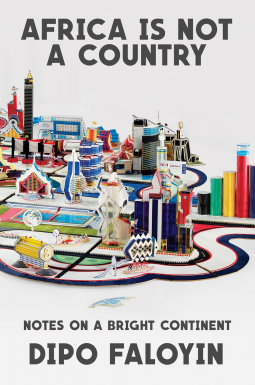
Africa Is Not a Country
Notes on a Bright Continent
by Dipo Faloyin
This title was previously available on NetGalley and is now archived.
Send NetGalley books directly to your Kindle or Kindle app
1
To read on a Kindle or Kindle app, please add kindle@netgalley.com as an approved email address to receive files in your Amazon account. Click here for step-by-step instructions.
2
Also find your Kindle email address within your Amazon account, and enter it here.
Pub Date Sep 06 2022 | Archive Date Aug 31 2022
Talking about this book? Use #AfricaIsNotaCountry #NetGalley. More hashtag tips!
Description
An exuberant, opinionated, stereotype-busting portrait of contemporary Africa in all its splendid diversity, by one of its leading new writers.
So often, Africa has been depicted simplistically as a uniform land of famines and safaris, poverty and strife, stripped of all nuance. In this bold and insightful book, Dipo Faloyin offers a much-needed corrective, weaving a vibrant tapestry of stories that bring to life Africa’s rich diversity, communities, and histories.
Starting with an immersive description of the lively and complex urban life of Lagos, Faloyin unearths surprising truths about many African countries’ colonial heritage and tells the story of the continent’s struggles with democracy through seven dictatorships. With biting wit, he takes on the phenomenon of the white savior complex and brings to light the damage caused by charity campaigns of the past decades, revisiting such cultural touchstones as the KONY 2012 film. Entering into the rivalries that energize the continent, Faloyin engages in the heated debate over which West African country makes the best jollof rice and describes the strange, incongruent beauty of the African Cup of Nations. With an eye toward the future promise of the continent, he explores the youth-led cultural and political movements that are defining and reimagining Africa on their own terms.
The stories Faloyin shares are by turns joyful and enraging; proud and optimistic for the future even while they unequivocally confront the obstacles systematically set in place by former colonial powers. Brimming with humor and wit, filled with political insights, and, above all, infused with a deep love for the region, Africa Is Not a Country celebrates the energy and particularity of the continent’s different cultures and communities, treating Africa with the respect it deserves.
About the Author: Dipo Faloyin is a senior editor at VICE, where he focuses on race, culture, and identity around the world. His writing has appeared in Dazed, Prospect, and HuffPost. Born in Chicago, raised in Lagos, he now lives in London.
Advance Praise
"A necessary book that deserves its place in the canon as essential reading for anyone seeking an introduction to this vast continent—as well as the rest of us, who need to be regularly challenged on what we think we know about Africa and the damage done by that." - Sally Hayden, Irish Times
"Warm, funny, biting and essential reading." - Adam Rutherford, author of How to Argue With a Racist
"A brilliant, prescient exploration of a richly complex continent. An antidote for our times." - Irenosen Okojie, author of Nudibranch
"This book is hilarious, ferocious, generous, and convincing. It made me reconsider almost everything I thought I knew about Africa, which is somewhere we often hear about, but far too rarely hear from." - Oliver Bullough, author of Moneyland
"An impeccably researched work, brimming with humor and intellect. A necessary read for 2022." - J K Chukwu, author of The Unfortunates
"A triumph of a book. A charismatic and hugely enjoyable read packed full of essential information—revealing a huge, vastly diverse set of stories, situations, and histories that really do pop the balloon of lazy stereotyping of Africa. You’d be doing yourself a disservice if you didn’t read this book." - Nels Abbey, coauthor of Think Like a White Man
Available Editions
| EDITION | Hardcover |
| ISBN | 9780393881530 |
| PRICE | $30.00 (USD) |
Average rating from 8 members
Featured Reviews
 Geoffrey S, Librarian
Geoffrey S, Librarian
When I glanced over the table of contents and the various topics that Dipo Faloyin’s “Africa is Not a County” was to cover, I initially wasn’t sure what to make of them. Ranging from the carve-up of the continent by European powers, to the jollof rice rivalry that exists between several west African nations, to a brief visit to his native Lagos, it all felt a little disparate to me. But once I was several chapters in, I found myself completely engrossed. Faloyin’s selected subjects work as both a mercilessly fierce multi-pronged attack on the long-standing stereotypes of Africa as a famine/poverty/corruption/war-stricken, rural, backward “Lion King”-esque monolith of a land and also a fantastic introduction to the continent’s true diversity and complexity.
The book almost feels like a must-read for countless others, and not just for those caught in the thrall of a simplistic all-Africa-is-all-just-the-same mindset. I came into the book with a somewhat better grasp of reality than that. However, the avalanche of information that Faloyin provided through his sharp writing made me intensely aware of all that I didn’t really know (which turned out to be quite a lot, to say the least). Also, to my great appreciation it simultaneously gave me a large head start in filling in my relevant knowledge gaps. As I worked my way from chapter to chapter, I compiled a sizably long mental and also physical lists of people, places, and other items that I wanted to explore further on my own later - which to me, is always an indisputable mark of a high-quality work of myth-busting non-fiction.
Packed from beginning to start with immense informative and eye-opening power, “Africa is Not a Country” is definitely not a title to be overlooked. After I suggest this for purchase at both the academic library I work at and my local public library, I look forward to overzealously recommending it to my friends and family.
Informative and irreverent, blunt in its truth telling, and wonderfully hopeful about the future of the fifty-four countries of the African continent, Dipo Faloyin’s book is so, so good. And generous, to have taken the stories of so many countries - obviously not all of them, and not in depth, that would be so many books - and shared them with the knowledge that a lot of guilty white people would be reading it. Faloyin is unsparing in his criticism of the racism which still drowns any discussion of Africa in the West, and explores the colonial legacy which slid gently into the white-saviour voluntourism which became so popular; the refusal to return looted artefacts, and the insistence of most Western media to portray all African countries as the same and also poor and backward.
This was informative, funny, and also full of realistic actions to take. Faloyin is Nigerian, and that is the lens from which he writes - including a chapter on how Jollof rice is claimed by many African countries but really, only Nigerians know how to make it properly. Throughly enjoyed this book, and appreciated the ways in Faloyin singled out different facets of systemic racism and how it influences how we speak about any and all African countries.
 Educator 1004199
Educator 1004199
Slow clap, folks, slow clap. I’m standing up for this one. Africa Is Not A Country: Notes On A Bright Continent is everything it aims to be: a sharp, well-researched critique of white-centric historical narrative and a sharp, well-researched critique of racial “enlightenment” today. For all the progress the world collectively has made in the direction of decolonization, we have not gotten very far. In so many ways, we’ve just gone in circles, retracing the road of colonialism with new vehicles. The route of racism is well-worn, a hard path to diverge from. What’s that phrase…The road to hell is paved with good intentions… that’s the one. That’s what Faloyin highlights in Africa Is Not A Country: the fact that colonization has continued to perpetuate, only in different modes — and still insidiously, under a familiar guise of tolerance and progressivism. Ugh, now that I write that I can see nothing has changed, even the veneer of human compassion.
The “Civilizing Mission” lives. Paternalism thrives in our media-frenzied, self-care touting, feel-good-no-matter-who-pays-for-it society. For the love of biscuits, will it ever just die? No. No, it won’t. That’s Faloyin’s message. It is a dismal one, but Africa Is Not A Country delivers it with witty, authentic, impassioned prose that balances intellect with humor. Faloyin does not hold back; words are weaponized in this work, they aim with accuracy at whiteness and the continuing erasure of Africa in all its dimensions. This use of language is especially poignant; it has been for so long used against the “formerly” colonized world, it is refreshing to see the ammunition firing from the other side.
On that note: The language is highly accessible and the case studies within appeal across generations. I am seriously considering assigning this in my courses on the history of racism. It is is not academic in the strict sense, but the historical content is sound and importantly, it communicates without pedantism, without supercilious lordliness. It’s downright funny in parts (well, as funny as history can be.) The case studies Faloyin examines are recognizable; students will be able to relate to this material with little explanation. For example, Africa Is Not A Country discusses white saviorism in entertainment, film, and on social media. Even if they are unfamiliar with specific events, they are savvy enough with the world of entertainment and social media to understand the historical implications and contemporary consequences.
The structure of the book is also well-suited to the classroom (and for any reader). It maps a chronological logic for the reader. The first chapters are focused on history, giving the reader ample and necessary context to understand what follows. Specifically, it provides necessary context about the Berlin Conference of the 1880s in which the powers of Europe literally carved up the African continent to assuage their imperial satisfaction. Prior to this international conspiracy and violation, the continent was autonomous and its peoples organically organized, if not always harmoniously, then at least according to their own choices and actions. The eradication of African sovereignty, identity, complexity, and visibility occurs rapidly from that point, undergirded by a much older and very established historical foundation of Orientalism and pseudo-scientific racism. The remaining chapters reveal to the reader how such erasure has continued and been actively perpetuated, purposefully and unintentionally. The division of these chronological events into short, assignable chapters serve classroom/course use well.
My courses are built for students of color, students who come from immigrant backgrounds, are first generation college students, and generally have little experience with academia and the culture of the academic elite. Africa Is Not A Country is perfect for the student population I serve.
Africa Is Not A Country is written with the African continent and its peoples in mind, but coming from a former British colony I found deep connection with this historical/contemporary commentary. Faloyin is Nigerian; in parts where he brought forth his own history I smiled at particularly British colonial references and uses of language. I could almost hear my mother’s voice in some of the words… I could not help but laugh out loud sardonically every now and then. The chapter on “We are the world” (yes, that ubiquitous song touting a generic Let’s-all-get-along-we-just-have-to-try message) summoned up memories and a bit of shame; I loved that song, sang it at all my family’s karaoke-pot-luck parties as a child. I remember believing so wholeheartedly that I was that future.
And that’s the horror of white paternalism. Colonialism was so successful; we are all complicit in it, regardless of our heritage, our race, our histories. That too is Faloyin’s message.
That said, ultimately, Africa Is Not A Country is also about keeping up the fight. Despite everything and all the obstacles we all must continue to work towards decolonization. This book serves as a necessary eye-opener for everyone. For some readers it is a reminder, an epiphany for others. This is a book for everyone: People of color, from any “former” or current colony, for those of European descent, for those at the beginning of their decolonization or those in the thick of it (who might need a jolt or encouragement). We are all descendants and inheritors of colonial culture.
Readers who liked this book also liked:
We Are Bookish
Literary Fiction, Multicultural Interest, Women's Fiction
Silvia Moreno-Garcia
Historical Fiction, Literary Fiction, Sci Fi & Fantasy
We Are Bookish
Mystery & Thrillers, OwnVoices, Teens & YA
We Are Bookish
Biographies & Memoirs, Nonfiction (Adult), Parenting, Families, Relationships
Rachel Joyce
Historical Fiction, Literary Fiction, Women's Fiction
We Are Bookish
Multicultural Interest, Mystery & Thrillers, Teens & YA
We Are Bookish
Arts & Photography, Health, Mind & Body, OwnVoices


















